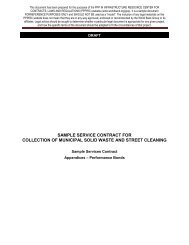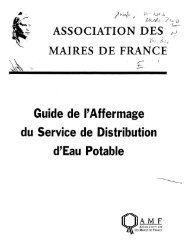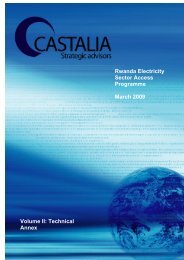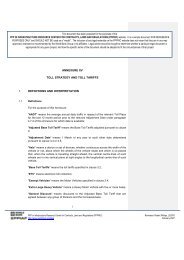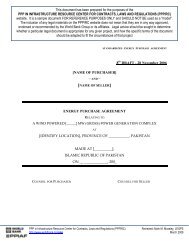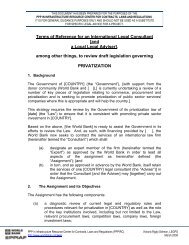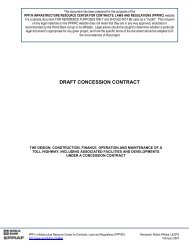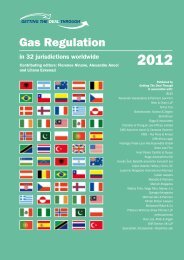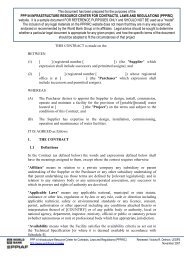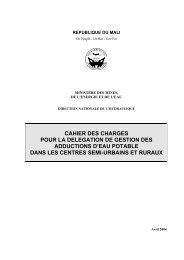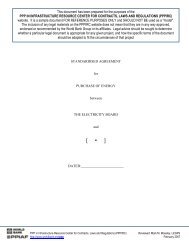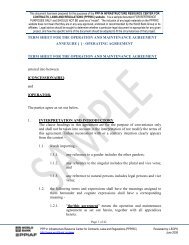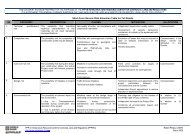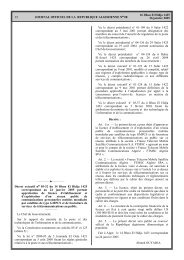Volume I: Investment Prospectus Rwanda Electricity Sector Access ...
Volume I: Investment Prospectus Rwanda Electricity Sector Access ...
Volume I: Investment Prospectus Rwanda Electricity Sector Access ...
- No tags were found...
Create successful ePaper yourself
Turn your PDF publications into a flip-book with our unique Google optimized e-Paper software.
In order to provide a realistic view of the number of new connections that can be obtainedwithin a particular sublocation, an analysis of the affordability of electricity was carried out.The approach to account for the affordability of electricity in different parts of the country isdescribed in Box 4.1 (below).Box 4.1: Evaluating the Affordability of <strong>Electricity</strong> in <strong>Rwanda</strong>The poverty map presented as Figure 4.5 suggests that careful consideration needs to be given toaffordability in the planning the access programme. Although the Government and developmentpartners want to extend access to electricity to help alleviate poverty, these objectives need to bebalanced against the financial sustainability of the programme by considering the ability of householdsto pay for electricity.There is currently no detailed information on ability to pay for electricity in <strong>Rwanda</strong>. This <strong>Prospectus</strong>uses data on household expenditures from the Household Living Conditions Study (EICV2) andstudies on comparative expenditures on energy in the region (Kebede et al (2002) and Karekezi(2002)). The EICV2 survey collected data on 6,900 households and divides the country into 30districts, which are then split into expenditure quintiles. A recent survey commissioned by theEuropean Union has also been used to compare the results of the EICV2 survey with more recentdata.The data broadly shows that the average household in the highest quintile in each district spends 3times the average household in the next highest spending quintile, and 13 times the average householdin the lowest quintile. The data also shows that households in the Kigali area are able to spendrelatively more than other parts of the country. Widespread poverty nevertheless remains in the Kigaliarea, with over 40 percent of survey respondents spending less than US$2.50 per week.The survey responses have been used to estimate the proportion of households in each district able toafford an electricity connection, assuming that a household will be able to afford an electricityconnection if:Total Expenditure * Energy Expenditure (%) > Current Tariff * Minimum Consumption (kWh)The minimum consumption level is assumed to be 20kWh per month. This is a very low level ofconsumption from 2–3 energy efficient light bulbs and a radio. The proportion of energy expenditurein each household will vary depending on the characteristics of each household and community, andon the cost of electricity substitutes (such as kerosene, batteries and candles). Arecent comparative study (Karekezi (2002)) found that urban household expenditures on energy inAfrica ranged from 12.5 percent in Burkino Faso to almost 25 percent in Mauritania. Data from anearlier study of energy expenditures in Ethiopia (Kedebe (2002)) also support two importantconclusions:• Poorer households (typically in more rural communities) tend to spend a higher proportion oftheir expenditures on energy. This is because household expenditures in rural areas do not includefood that is grown within the household.• Average household expenditures on fuel and power are typically in the range of 5–6 percent inurban areas, and 10–12 percent in rural areas.The following assumptions have been used on the maximum proportion of expenditures that wouldbe spent on electricity in <strong>Rwanda</strong>, which provides the following approximate average expenditures onelectricity:Area Max. Energy Expenditures (%) Expenditures on Min. Consumption (%)Urban 10 2–3Peri-urban 15 4–5Rural 20 8-10Deep rural 25 10-1421



